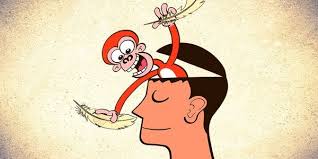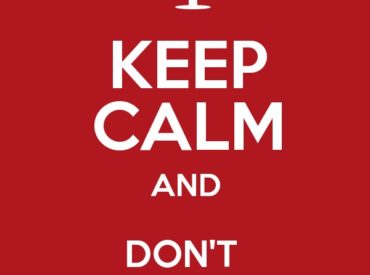Many of us have what’s commonly called, “monkey mind” or “busy brain.” Your inner dialogue is going crazy and running amok all day long. It seems like the monkey will not slow down. He’s running wild.
Monkey mind can be exhausting because your thoughts are constantly going, going, going. If you wake up with the monkey mind racing it doesn’t tend to start your day well.
Our human brain is capable of thinking 1300 words per minute so you can only imagine how hard it is not to have a thought.
What can you do about it?
- First of all, I’m not sure it’s really possible to have no thoughts. I’ve certainly met no one capable of that. The point is to decrease the thoughts and change their content, not get rid of them completely. That should take the pressure off because most people think the goal is to have zero thoughts. Not gonna happen.
2. Exercise helps release endorphins which soothes the brain and body and quiets the monkey mind. If you don’t have a lot of time to exercise on any given day, even a quick walk will help. Or run up and down the stairs in your house for five minutes. Exercise such as tai chi, yoga and qigong, helps to quiet the mind by putting the attention on the breath. Just get up and move somehow and somewhere. Where or how doesn’t matter as much as moving.
3. Then there’s the “M” word – meditation. Most people are scared of it because they think you have to sit on the floor ohm-ing for an hour. Not true. Meditation is withdrawing your focus from the outside world, going inward. It’s not having zero thoughts. That’s a misnomer.
Everyone has five minutes a day they can do this. Everyone. If you work in an office, shut the door if you have one, close your eyes for five or put in your earbuds and tune out. Same applies at home – take five. Settle the mind. You can do it while cooking by focusing on what you’re doing, not letting the monkey run wild.
4. Food can also affect the monkey mind. Do your best to remove stimulants – coffee, yes, I said it – sugar, processed foods and alcohol. Yep, I know, all the “fun” foods, right? Once you get used to eliminating most or all of them you won’t miss them, I promise. Stimulants affect the mind because they cause the brain to produce more thoughts, usually anxiety producing ones, the opposite of what we want.
5. Alcohol is a depressant so it can produce depressing thoughts, which are usually fear based. Once the fear kicks in, the anxiety starts. Many of our thoughts are fear based if you stop to examine them.
6. I am not an advocate of prescription medications but if you feel comfortable with them, you may look into something for anxiety if your monkey is that wild. There are plenty of supplements that will also help calm your thoughts, in fact, there is one called Calm Thoughts, and others that reduce adrenaline production. Adrenaline stimulates the monkey. It’s like crack for the monkey.
7. There are many other new techniques today, such as brain wave entrainment, that work with brain waves to help calm the monkey mind. Music and binaural beats also help soothe the beast. You can find binaural beats for free on youtube.
Don’t Try to Catch the Monkey
The goal is not to catch the monkey and put him back in the cage. The monkey will rebel if you do that and you’ll drive yourself crazy trying to catch him. The goal is to let the monkey go. If you want to work with this analogy, see him calming down, then open the door and let him walk out. His presence is no longer needed. Or maybe he just wants to take a nap. You may have to do this every hour or every day when you’re first learning to do this. It’s ok, all change is a process.
The Monkey Doesn’t Control You
The monkey doesn’t control us, he isn’t us. The monkey is our thoughts gone wild. The first step to change is awareness. First be aware that you have a monkey running wild in your head. Then work with some of the suggestions above to see if you can calm him down and eventually invite him out of your head. Or let him take a nap while you focus on your life.






